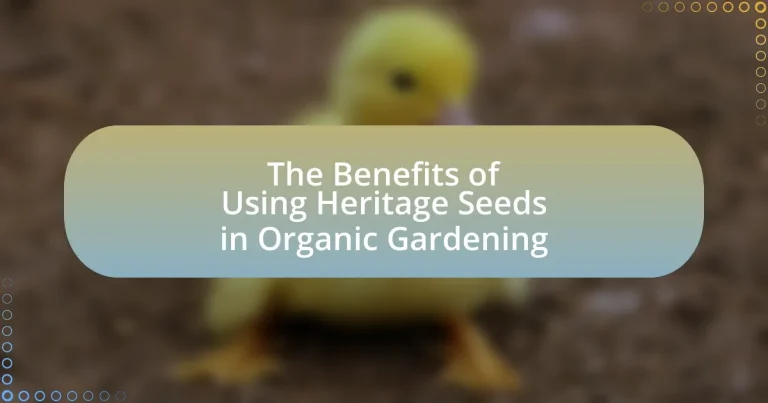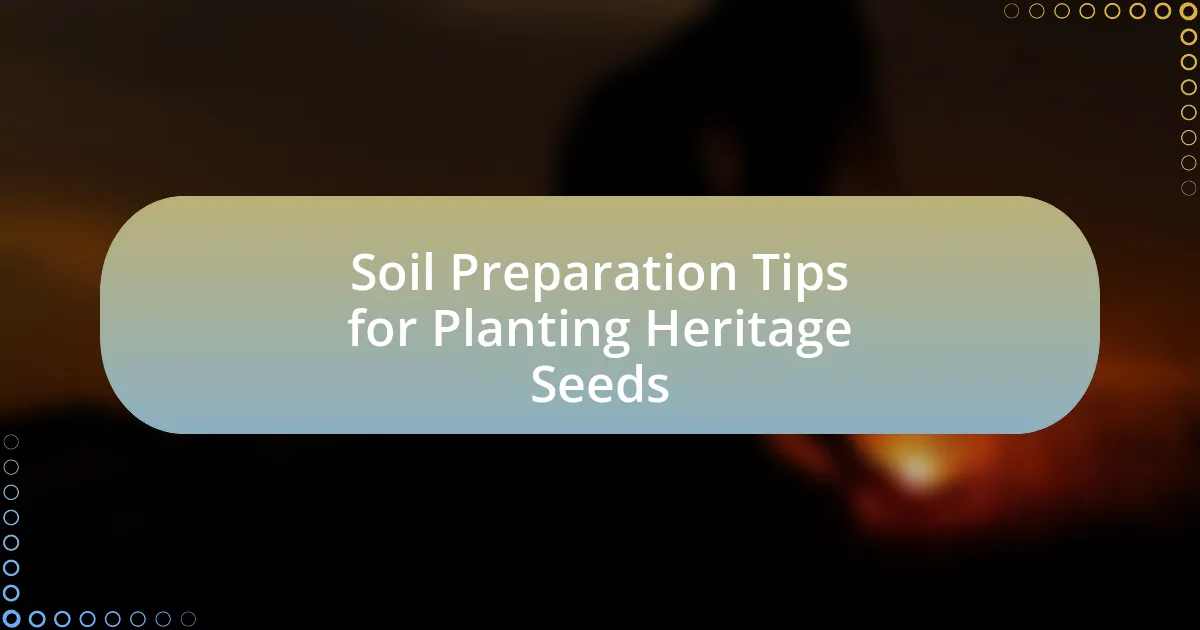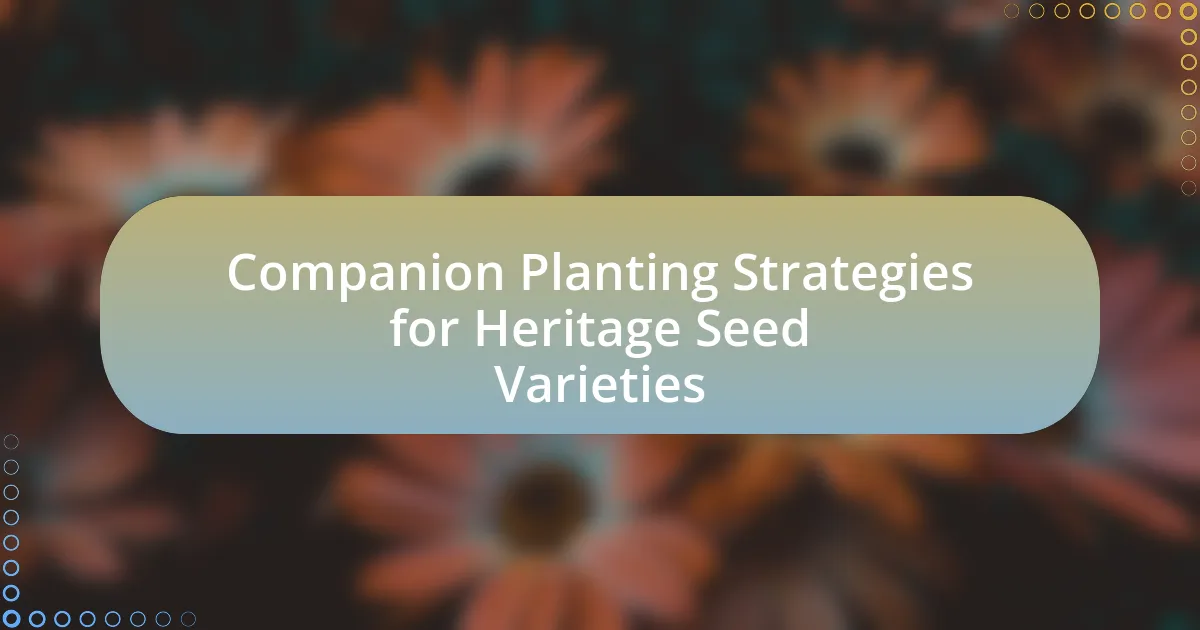Heritage seeds are traditional, open-pollinated varieties that have been preserved over generations, playing a crucial role in organic gardening by promoting biodiversity and enhancing crop resilience. This article explores the significance of heritage seeds, highlighting their advantages over hybrid and GMO seeds, including superior flavor, nutritional value, and adaptability to local conditions. It also discusses the environmental benefits of using heritage seeds, such as improved soil health, support for pollinator populations, and sustainable agricultural practices. Additionally, practical tips for maximizing the benefits of heritage seeds, including seed saving and companion planting, are provided to assist gardeners in optimizing their organic gardening efforts.

What are Heritage Seeds and Why are They Important in Organic Gardening?
Heritage seeds are traditional varieties of seeds that have been passed down through generations, often characterized by their open-pollinated nature, which allows them to be saved and replanted year after year. These seeds are important in organic gardening because they promote biodiversity, preserve genetic diversity, and often yield crops that are better adapted to local growing conditions. Studies have shown that heritage varieties can have superior flavor and nutritional value compared to modern hybrids, making them a valuable choice for organic gardeners seeking to enhance the quality of their produce. Additionally, using heritage seeds supports sustainable agriculture practices by reducing reliance on commercial seed companies and fostering a connection to local agricultural history.
How do Heritage Seeds differ from Hybrid and GMO Seeds?
Heritage seeds differ from hybrid and GMO seeds primarily in their genetic makeup and breeding methods. Heritage seeds are open-pollinated varieties that have been passed down through generations, maintaining genetic diversity and adaptability, while hybrid seeds result from controlled cross-breeding of two different parent plants to produce specific traits, and GMO seeds are genetically modified organisms that have been altered at the DNA level to express desired characteristics. Heritage seeds often exhibit resilience to local growing conditions and can be saved and replanted, unlike hybrid seeds which may not produce true-to-type offspring and GMO seeds which are subject to patent restrictions and regulatory oversight.
What characteristics define Heritage Seeds?
Heritage seeds are defined by their ability to be open-pollinated, which allows them to produce seeds that can be saved and replanted in subsequent seasons. These seeds are typically heirloom varieties, meaning they have been passed down through generations, often for at least 50 years, and are known for their unique flavors, colors, and resilience to local growing conditions. Additionally, heritage seeds contribute to biodiversity, as they encompass a wide range of genetic traits that can adapt to various environments, thus supporting sustainable agriculture practices.
Why are Heritage Seeds considered more sustainable?
Heritage seeds are considered more sustainable because they promote biodiversity and are adapted to local growing conditions. These seeds have been passed down through generations, allowing them to develop resilience to pests and diseases specific to their environment. Research indicates that using heritage seeds can enhance soil health and reduce the need for chemical inputs, as they often require fewer resources to thrive. Additionally, heritage seeds contribute to the preservation of genetic diversity in agriculture, which is crucial for food security and ecosystem stability.
What role do Heritage Seeds play in biodiversity?
Heritage seeds play a crucial role in biodiversity by preserving genetic diversity within plant species. These seeds are open-pollinated and have been passed down through generations, maintaining unique traits that contribute to a wider variety of crops. This genetic diversity is essential for ecosystem resilience, as it allows plants to adapt to changing environmental conditions and resist pests and diseases. Studies have shown that maintaining diverse seed varieties can enhance agricultural sustainability and food security, as evidenced by the fact that over 90% of the world’s food supply relies on just 30 crops, highlighting the need for a broader genetic base to ensure future resilience.
How do Heritage Seeds contribute to ecosystem health?
Heritage seeds contribute to ecosystem health by promoting biodiversity and resilience within agricultural systems. These seeds are often open-pollinated and adapted to local conditions, which enhances genetic diversity among plant populations. Increased genetic diversity allows ecosystems to better withstand pests, diseases, and climate fluctuations, as evidenced by studies showing that diverse crop systems can reduce the need for chemical inputs and improve soil health. For instance, research published in the journal “Agriculture, Ecosystems & Environment” indicates that diverse cropping systems can enhance ecosystem services such as pollination and nutrient cycling, ultimately leading to more sustainable agricultural practices.
What is the significance of preserving genetic diversity in plants?
Preserving genetic diversity in plants is crucial for ensuring ecosystem resilience and food security. Genetic diversity allows plants to adapt to changing environmental conditions, resist pests and diseases, and maintain productivity. For instance, a study published in the journal “Nature” highlights that diverse plant populations are more resilient to climate change impacts, as they possess a wider range of traits that can withstand extreme weather events. Additionally, maintaining genetic diversity in crops can lead to improved yields and nutritional quality, as demonstrated by research from the International Food Policy Research Institute, which found that diverse genetic resources can enhance food systems and agricultural sustainability.
What are the benefits of using Heritage Seeds in organic gardening?
Heritage seeds offer several benefits in organic gardening, primarily promoting biodiversity and sustainability. These seeds are open-pollinated, meaning they can be saved and replanted year after year, which supports self-sufficiency and reduces reliance on commercial seed sources. Additionally, heritage seeds often exhibit greater resilience to local pests and diseases due to their adaptation to specific environments over generations. Research indicates that using heritage varieties can enhance soil health and ecosystem balance, as they contribute to a diverse gene pool that supports pollinators and beneficial insects. Furthermore, heritage seeds typically have superior flavor and nutritional value compared to many hybrid varieties, making them a preferred choice for organic gardeners focused on quality produce.
How do Heritage Seeds enhance flavor and nutrition in crops?
Heritage seeds enhance flavor and nutrition in crops by preserving genetic diversity and traditional growing practices. These seeds often originate from varieties that have been cultivated for generations, resulting in crops that possess richer flavors and higher nutrient content compared to modern hybrids. Research indicates that heritage varieties can contain higher levels of vitamins and minerals, as they are bred for taste and nutritional value rather than uniformity and shelf life. For example, a study published in the Journal of Agricultural and Food Chemistry found that heirloom tomatoes have significantly higher levels of antioxidants compared to commercial varieties, demonstrating the nutritional advantages of heritage seeds.
What economic advantages do Heritage Seeds offer to gardeners?
Heritage seeds provide economic advantages to gardeners by promoting cost savings through seed saving and enhancing crop resilience. Gardeners can save seeds from their heritage plants for future planting, reducing the need to purchase new seeds each season, which can lead to significant long-term savings. Additionally, heritage varieties are often more resilient to local pests and diseases, resulting in lower costs associated with pest control and higher yields. Research indicates that heritage seeds can adapt better to local growing conditions, which can further enhance productivity and reduce the economic risks associated with crop failure.

How can Heritage Seeds improve soil health and resilience?
Heritage seeds can improve soil health and resilience by promoting biodiversity and enhancing soil structure. These seeds are often adapted to local conditions, which allows them to thrive without excessive chemical inputs, thereby fostering a more balanced ecosystem. Research indicates that diverse plant varieties contribute to healthier soil microbiomes, which are crucial for nutrient cycling and soil fertility. Additionally, heritage seeds typically have deep root systems that improve soil aeration and water retention, further enhancing resilience against drought and erosion. Studies have shown that farms utilizing heritage seeds report increased soil organic matter and improved overall soil health metrics, validating their role in sustainable agriculture.
What practices can be implemented to maximize the benefits of Heritage Seeds?
To maximize the benefits of Heritage Seeds, gardeners should implement practices such as crop rotation, companion planting, and seed saving. Crop rotation enhances soil health and reduces pest buildup, which is crucial for the sustainability of Heritage Seeds. Companion planting involves growing different plants together to improve growth and deter pests, thereby increasing the yield and resilience of Heritage varieties. Seed saving allows gardeners to preserve the genetic diversity of Heritage Seeds, ensuring their availability for future planting and adaptation to local conditions. These practices not only enhance the productivity of Heritage Seeds but also contribute to biodiversity and ecological balance in organic gardening.
How does crop rotation with Heritage Seeds affect soil quality?
Crop rotation with Heritage Seeds significantly improves soil quality by enhancing nutrient availability and promoting biodiversity. This practice allows different crops to replenish specific nutrients in the soil, reducing the risk of nutrient depletion associated with monoculture. For instance, legumes, often included in crop rotation, fix nitrogen in the soil, which benefits subsequent crops. Research indicates that diverse crop rotations can increase organic matter content and microbial activity, leading to healthier soil ecosystems. Studies have shown that farms employing crop rotation with diverse Heritage Seeds experience improved soil structure and fertility, ultimately resulting in higher yields and better resilience against pests and diseases.
What are the best companion plants for Heritage Seeds?
The best companion plants for Heritage Seeds include marigolds, basil, and nasturtiums. Marigolds deter pests and attract beneficial insects, enhancing the health of nearby heritage crops. Basil improves the flavor of tomatoes and repels certain pests, making it an excellent companion for heritage tomato varieties. Nasturtiums serve as a trap crop for aphids, protecting other plants while providing edible flowers and leaves. These companion plants support biodiversity and promote a healthier garden ecosystem, which is essential for the success of heritage seeds in organic gardening.
How do Heritage Seeds support local ecosystems?
Heritage seeds support local ecosystems by promoting biodiversity and enhancing soil health. These seeds are often heirloom varieties that have adapted to local conditions over generations, which means they can thrive in specific climates and soil types, thereby maintaining the genetic diversity of plant species. This diversity is crucial for ecosystem resilience, as it allows for a wider range of interactions among species, including pollinators and beneficial insects. Additionally, heritage seeds typically require fewer chemical inputs, which reduces pollution and supports a healthier soil microbiome, further contributing to ecosystem stability. Studies have shown that diverse plantings can improve ecosystem services such as pest control and nutrient cycling, reinforcing the importance of heritage seeds in sustainable agriculture.
What impact do Heritage Seeds have on pollinator populations?
Heritage seeds positively impact pollinator populations by providing diverse and resilient plant varieties that attract a wide range of pollinators. These seeds often produce flowers with specific traits, such as varied colors and shapes, which are more appealing to different species of bees, butterflies, and other pollinators. Research indicates that gardens planted with heritage seeds can support higher biodiversity among pollinator species compared to those using hybrid or commercially produced seeds. For instance, a study published in the journal “Agriculture, Ecosystems & Environment” found that diverse plantings, including heritage varieties, increased pollinator visitation rates by up to 50%, demonstrating their crucial role in sustaining healthy pollinator communities.
How can Heritage Seeds help in pest management?
Heritage seeds can help in pest management by promoting biodiversity and resilience in crops. These seeds are often heirloom varieties that have adapted to local conditions over generations, making them more resistant to pests and diseases. Research indicates that diverse plantings can disrupt pest life cycles and reduce infestations, as seen in studies where mixed cropping systems led to lower pest populations compared to monocultures. By using heritage seeds, gardeners can enhance the ecological balance in their gardens, leading to natural pest control mechanisms.

What challenges might gardeners face when using Heritage Seeds?
Gardeners may face several challenges when using Heritage Seeds, including lower germination rates and susceptibility to pests and diseases. Heritage Seeds often have not been bred for uniformity or high yields, which can lead to inconsistent growth and crop failure. Additionally, these seeds may require more specific growing conditions and care, making them less forgiving for novice gardeners. Research indicates that Heritage varieties can be more vulnerable to environmental stressors, which can impact their overall productivity.
How can gardeners overcome the limitations of Heritage Seeds?
Gardeners can overcome the limitations of Heritage Seeds by implementing diverse planting strategies and utilizing companion planting techniques. These methods enhance genetic diversity and resilience against pests and diseases, which are common challenges associated with Heritage Seeds. For instance, planting a variety of seed types can mitigate the risk of crop failure due to specific vulnerabilities, as evidenced by studies showing that polycultures often yield better results than monocultures. Additionally, companion planting, where different plants are grown together to benefit each other, can improve soil health and deter pests, further supporting the successful cultivation of Heritage Seeds.
What are common misconceptions about Heritage Seeds?
Common misconceptions about heritage seeds include the belief that they are less productive than hybrid seeds, that they are difficult to grow, and that they lack disease resistance. In reality, heritage seeds can produce yields comparable to hybrids, especially when grown in suitable conditions. Additionally, many heritage varieties are well-adapted to local climates and can thrive with proper care. Furthermore, numerous heritage seeds have been bred for resilience against specific diseases, making them viable options for organic gardening. These misconceptions often stem from a lack of understanding of the diverse characteristics and advantages that heritage seeds offer.
How can gardeners ensure successful germination and growth of Heritage Seeds?
Gardeners can ensure successful germination and growth of Heritage Seeds by providing optimal soil conditions, adequate moisture, and appropriate temperature. Heritage Seeds thrive in well-draining, nutrient-rich soil, which can be achieved by incorporating organic matter such as compost. Consistent moisture is crucial; seeds should be kept moist but not waterlogged, as this can lead to rot. Additionally, maintaining a temperature range of 65 to 75 degrees Fahrenheit promotes germination, as many Heritage Seeds require warmth to sprout effectively. Research indicates that seeds from heirloom varieties often have higher germination rates when these conditions are met, reinforcing the importance of proper care in the early stages of growth.
What practical tips can enhance the use of Heritage Seeds in organic gardening?
To enhance the use of Heritage Seeds in organic gardening, gardeners should prioritize seed saving, which allows them to maintain genetic diversity and adapt plants to local conditions. By selecting seeds from the best-performing plants each season, gardeners can ensure that their crops become increasingly suited to their specific environment. Additionally, practicing crop rotation with Heritage Seeds can improve soil health and reduce pest and disease pressure, as different plants can disrupt pest life cycles. Furthermore, using organic compost and natural fertilizers will support the growth of Heritage varieties, as these seeds often thrive in nutrient-rich soils. Research indicates that Heritage Seeds can yield better results in organic systems due to their adaptability and resilience, making these practices particularly effective.
How should Heritage Seeds be stored for optimal longevity?
Heritage seeds should be stored in a cool, dark, and dry environment to ensure optimal longevity. This storage method minimizes exposure to moisture, light, and temperature fluctuations, which can degrade seed viability. For instance, placing seeds in airtight containers, such as glass jars or vacuum-sealed bags, can further protect them from humidity and pests. Research indicates that seeds stored under these conditions can remain viable for several years, with some heritage seeds lasting up to 10 years or more when properly preserved.
What are the best resources for sourcing Heritage Seeds?
The best resources for sourcing Heritage Seeds include seed banks, local agricultural co-ops, and online retailers specializing in heirloom varieties. Seed banks like the Seed Savers Exchange offer a wide variety of heritage seeds that are preserved for their genetic diversity and historical significance. Local agricultural co-ops often carry regionally adapted heritage seeds, which can be beneficial for local gardening conditions. Additionally, online retailers such as Baker Creek Heirloom Seeds provide extensive catalogs of heritage seeds, ensuring access to rare and unique varieties. These resources are validated by their commitment to preserving biodiversity and promoting sustainable gardening practices.





